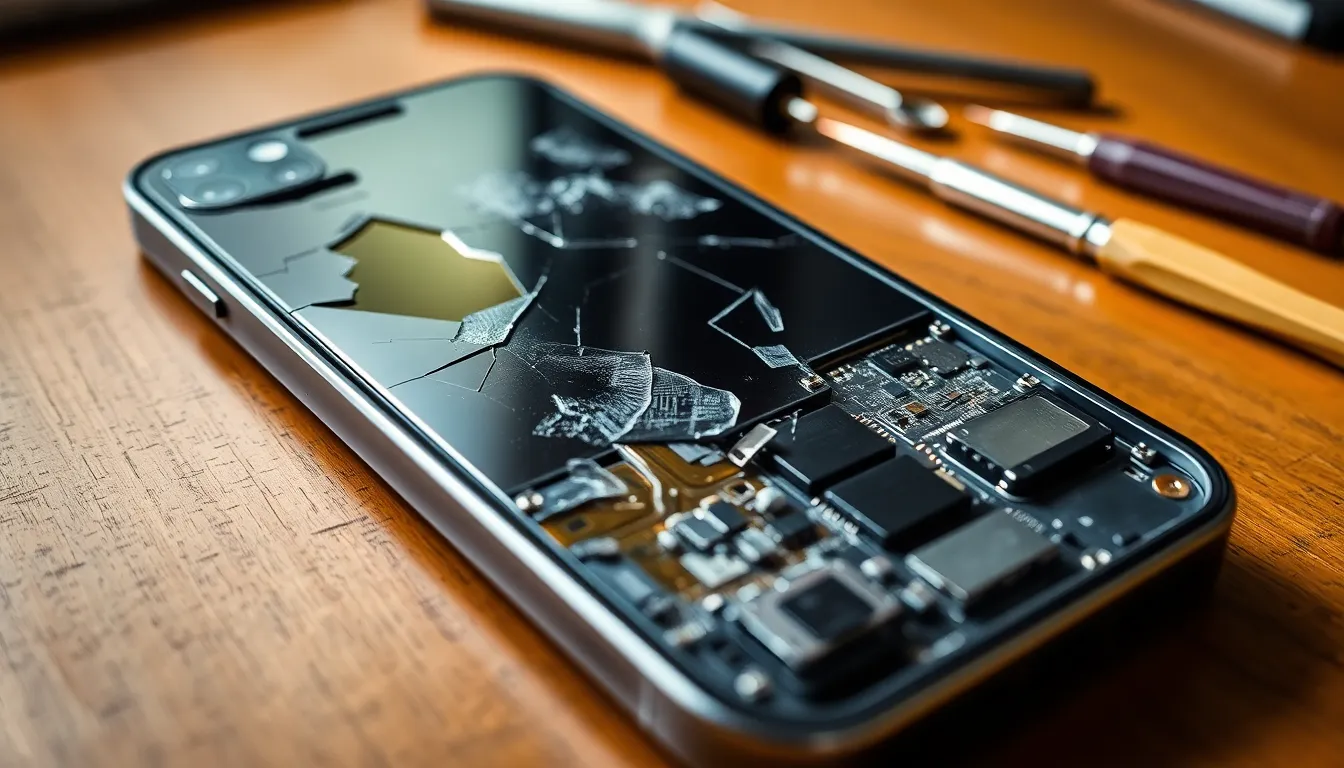Picture this: you’re in the middle of an epic text battle or about to crush your high score in Candy Crush when suddenly—bam! Your iPhone decides it’s nap time. Frustrating, right? You’re not alone in this technological drama. Many users are left scratching their heads, wondering why their trusty device has turned into a drama queen that shuts down at the worst possible moments.
Table of Contents
ToggleCommon Reasons for Unexpected Shutdowns
Unexpected shutdowns can arise from various factors. Identifying these reasons can aid in resolving the issue efficiently.
Battery Health Issues
Battery health plays a crucial role in device performance. Deteriorating batteries often contribute to unexpected shutdowns. Batteries lose capacity over time, especially if the device frequently undergoes extreme temperatures. Users can check battery health by navigating to Settings, then Battery, and finally Battery Health. An indicator below 80% represents potential trouble, as the battery might struggle to hold a charge under certain conditions. Replacing a worn-out battery can significantly improve reliability.
Software Glitches
Software glitches frequently cause devices to shut down unexpectedly. Outdated applications or system software may trigger instability, leading to sudden restarts. Users should regularly check for updates to maintain optimal performance. Clearing cache and data for apps could also resolve minor issues. If problems persist, restoring the device to factory settings often eliminates deeper software inconsistencies. Regular maintenance of software can ensure smoother operation and reduce crash incidents.
Hardware Problems

Unexpected shutdowns may stem from various hardware issues. Identifying these problems helps in taking appropriate action.
Faulty Components
Faulty components can trigger unexpected shutdowns. Loose connections or damaged internal parts often disrupt normal functioning. A malfunctioning battery can cause power supply inconsistencies as well. Users should examine their devices for any visible damage, especially after drops or impacts. Apple’s certified technicians can accurately diagnose hardware issues and recommend repairs or replacements when necessary.
Overheating Issues
Overheating issues frequently lead to abrupt shutdowns. High temperatures can occur from resource-intensive tasks or insufficient ventilation. Running demanding applications or experiencing external heat, like direct sunlight or warm environments, exacerbates the problem. iPhones contain built-in safety measures that automatically shut down the device to prevent damage. Keeping the device cool, especially during high-use periods, significantly helps in maintaining performance and reliability.
Software Solutions
Unexpected shutdowns can often be resolved through software solutions. Addressing these issues effectively can enhance device performance and user experience.
Updating iOS
Keeping iOS updated prevents many software-related shutdowns. Updates often contain bug fixes to eliminate glitches causing devices to restart unexpectedly. Users can check for available updates in the Settings app by navigating to General, then selecting Software Update. Updating to the latest version not only boosts security but also improves overall stability, reducing the likelihood of shutdowns during use. Regularly updating apps in the App Store is also beneficial in maintaining compatibility with the operating system.
Resetting Settings
Resetting settings can restore stability to an iPhone that frequently shuts down. This action resets all system settings without erasing personal data or media. Users can initiate this by going to Settings, tapping General, and selecting Transfer or Reset iPhone, then choosing Reset All Settings. This process can fix underlying software issues tied to configurations or preferences. Although users return to default settings, they retain their data, benefiting from refreshed functionality and reduced shutdown occurrences.
Preventative Measures
Maintaining an iPhone’s functionality requires proactive steps to prevent unexpected shutdowns. Regular maintenance and monitoring battery health play crucial roles in ensuring device reliability.
Regular Maintenance
Keeping iOS updated is essential for optimal performance. Regular updates often contain bug fixes that address various issues, including unexpected shutdowns. Users should consistently check the Settings app for the latest updates. System settings can also benefit from occasional resets, restoring stability without erasing personal data. Clearing app caches and managing storage helps prevent software glitches, reducing the chances of crashes. He or she should also consider limiting background app activity for better resource management.
Monitoring Battery Health
Monitoring battery health is vital for identifying potential issues. iPhone users can check battery health in Settings, where an indicator below 80% signifies an aging battery. High temperature exposure affects battery capacity. Keeping the device in cool environments prevents overheating, which can trigger automatic shutdowns. Users must also avoid intensive tasks during high temperature periods, as this increases stress on the battery. If battery health appears compromised, seeking professional assessment from certified technicians is advisable.
Unexpected shutdowns can be frustrating for iPhone users. Understanding the potential causes is crucial for effective troubleshooting. Regular maintenance of both battery and software is essential to enhance device performance and reliability. By monitoring battery health and addressing software glitches, users can significantly reduce the likelihood of abrupt shutdowns.
For those dealing with hardware issues or persistent problems, consulting with certified technicians can provide the necessary support. Taking proactive steps can ensure that the iPhone remains a reliable companion for daily tasks. With the right care and attention, users can enjoy a seamless experience without the drama of unexpected shutdowns.




